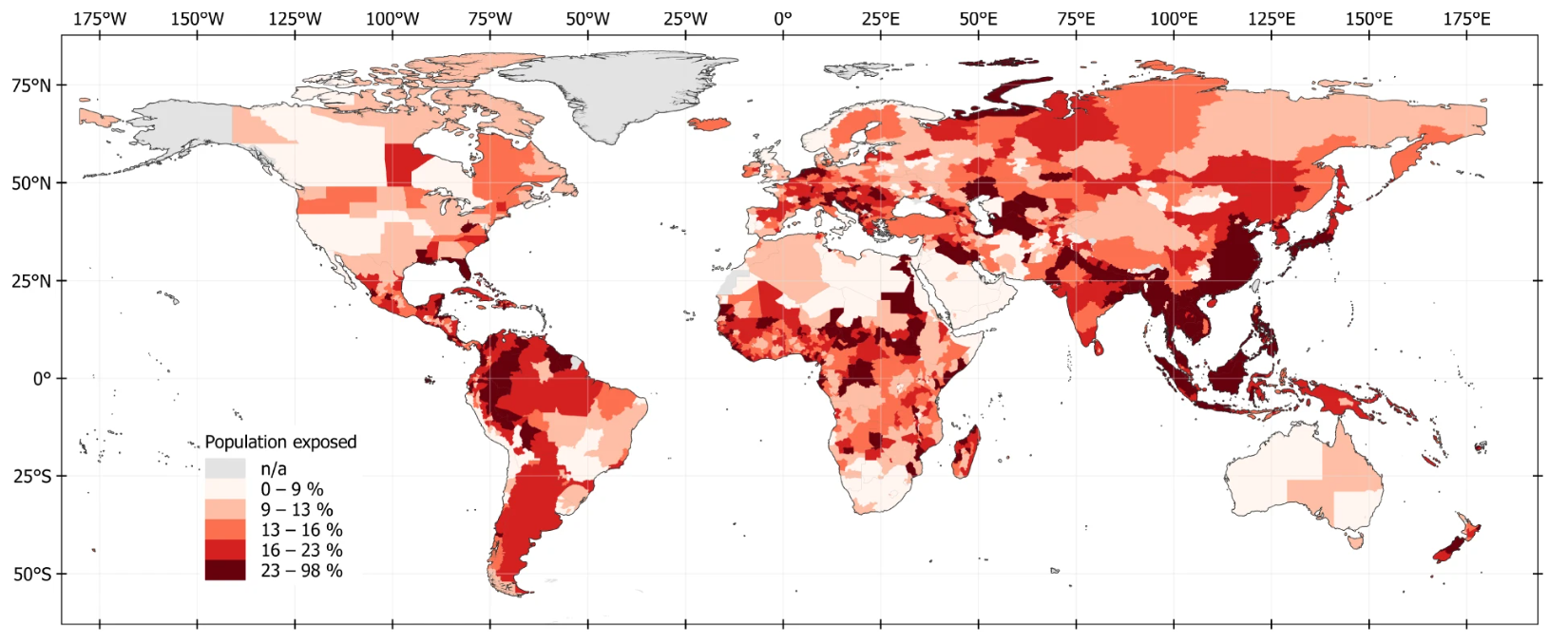By John Pickard
Last week in Lisbon the United Nations hosted a conference of those countries most at risk from climate change and the sea level rise that will result from it. Coincidentally, the same week, the science magazine Nature published an article highlighting the close connection between the damaging effects of climate change and poverty.
Entitled Flood exposure and poverty in 188 countries, the Nature found that the risk of flooding will have “particularly disastrous impacts” in low-income countries. It found that over 1.8bn people (nearly a quarter of the world’s population) would be directly exposed to “1-in-100-year floods.”
“Of these”, the article continues, “1.24 billion are located in South and East Asia, where China (395 million) and India (390 million) account for over one-third of global exposure. Low- and middle-income countries are home to 89% of the world’s flood-exposed people.
“Of the 170 million facing high flood risk and extreme poverty (living on under $1.90 per day), 44% are in Sub-Saharan Africa. Over 780 million of those living on under $5.50 per day face high flood risk. Using state-of-the-art poverty and flood data, our findings highlight the scale and priority regions for flood mitigation measures to support resilient development.” [see graphic above, from the article]
Costs of floods, wildfires and other natural disasters
Across the globe, natural disasters like floods, wildfires earthquakes and cyclones are estimated to cost up to $500bn, including direct and indirect costs. But it is in low-income countries, where flood barriers and other protective infrastructure are absent or under-developed, that the human and economic costs will be so much greater. And, as the article in Nature pointed out, “Recent disastrous floods in countries as diverse as Nigeria, Bangladesh, Vietnam, the United States, and the United Kingdom illustrate that the threat is a global reality”. It is not a problem for the distant future, but the next decade or two.
How severe and how frequent are floods likely to be in the coming decades? “Even in an optimistic climate change scenario”, the article says, “sea levels are estimated to rise up to 0.55 m by 2100, putting especially large coastal cities at risk. Land subsidence, often caused by unsustainable ground water extraction and drainage, has been shown to increase coastal flood risks at a rate four times faster than sea level rise.”

Speaking to the Guardian at the same conference, the UN secretary general, Antonio Guterres, commented that humanity is facing a “perfect storm” of crises. The most notable effect of the current economic and geo-political crises is that there is a widening gap between richer and the poorer countries. “Inequalities are still growing inside countries”, he pointed out, “but they are now growing in a morally unacceptable way between north and south and this is creating a divide which can be very dangerous from the point of view of peace and security.”
Small wonder, therefore, that at the UN conference, the representatives of those small island states most immediately threatened by sea-level rises, expressed their anger at the utter inactivity and outright neglect of the rich economies on climate change. Indeed, the G7 countries are already backsliding on the meagre promises they made at the COP26 conference in Glasgow last November.
Big oil and gas companies have humanity “by the throat”.
The heads of small island states such like Palau, Fiji and Tonga spoke about the devastation that will come from larger than normal typhoons, in conditions of rising sea levels. Climate threats will challenge the very existence of these small island nations in the coming decades.
Guterres was at least near the mark last month when he hit out at fossil fuel companies and the banks behind them, for a complete absence of any policy – other than public ‘greenwashing’ – to mitigate climate change. these big companies, Guterres pointed out, have humanity “by the throat”.
The big carbon dioxide-producing states are continuing to pump oil and gas at an every-increasing rate, and they are still pouring billions into the exploration and development of new deposits, in Africa, the South Atlantic and elsewhere. Since the war in Ukraine has threatened gas supplies to Europe, the German government has announced that it is considering re-commissioning coal-fired power stations that had been moth-balled. This is despite Guterres’ comment that “coal is enemy number one of climate action.”
As the article in Nature makes clear, it is the poorer countries that will suffer particularly from floods and extreme weather events in the coming decades. But the richer countries in the North will not go untouched. Last week also brought the grim news that record high temperatures were being recorded all over Europe and the northern hemisphere in general.
Record high temperatures across the northern hemisphere last week
According to the Washington Post, these are some of the records broken in the last week:
Downtown Rome hit its highest June temperature recorded at 40.8oC
Tuscany set a June record at 41.8oC
Norway’s largest port, Tromso, which is north of the Arctic Circle, reached at least 29.7oC, a record for June. Mehamm, located in Arctic Norway at 71°North, hit 30.8oC, shattering its previous June record by almost 10 degrees.
Vihti Maasoja in Finland set a June record of 31.4oC.
Knin, in Croatia, set a June record of 40.4oC.
Temperatures approached 50oC in Tunisia, just short of a new June record.
Tokyo had highs of over 35oC for four days in a row, a record for June.
Uchadzhi, in Turkmenistan saw the hottest June day ever in Central Asia, at 48.2oC.
Khor, in Iran, had its hottest day on record of any month, at 47.8oC.
At the COP26 conference in Glasgow, Greta Thunberg referred to the assembled representatives of governments, agencies and the big companies and their ‘pledges’ on climate change. It’s the same old “blah, blah, blah”, she said…and she was absolutely correct.

As long as the fate of humanity is left to the same people who have trashed the planet – the big oil, gas and coal companies and their political agents in power – then there is little hope of mitigating the very worst outcomes from climate change. We are already on track for an average increase in world temperatures of somewhere between 1.5oC and 2.0oC. As long as greed trumps need, as long as short-term profits outweigh the long-term interests of humankind, there will be no solution to the problem of climate change.
It is a matter of great sadness that Antonia Guterres and the leaders of those countries represented at the UN conference last week – those with the least opportunity to hold back the rising tide of greenhouse gases – are whistling into the wind, even though their dire warnings may be absolutely correct. They would be a lot more effective if they concentrated their fire on the real culprits…it is not humanity in general which is the problem, but an economic system based on the interests of a narrow, global, super-rich elite who control and manage the energy industry for their own power, prestige and profit.



